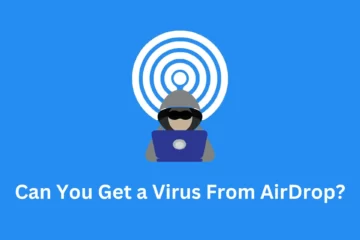The internet is the Wild West, where the good, bad, and ugly exists, including viruses. And to make matters worse, malicious software has become more sophisticated than ever.
Your security is at risk just by casually browsing the web. You’d be right to ask yourself, Can I get a virus from visiting a website?
But worry not — we’re here to help!
In this article, we’ll cover the most dangerous websites, potential malware threats, and how to safeguard yourself. Ready?
Contents
Can I get a virus from visiting a website?
You can get a virus and other malware from visiting an unsafe website. Unfortunately, some online platforms have loopholes that hackers exploit to inject malicious code.
Examples include ransomware, trojans, spyware, adware, and others. They will automatically download when you access compromised sites. Some (like worms) are even uniquely coded to self-install, while others require user action.
These threats can be dated back to 2001 with the deadly Code Red computer worm. It demolished websites and compromised information systems causing $2.75 billion in damages.
Since then, even deadlier viruses have shown up, such as Zeus, Slammer, Storm Worm, WannaCry, CryptoLocker, etc.
But why are websites such a popular hunting spot?
Cybercriminals prefer them because it’s easier to target millions of users. Moreover, they know you’re less likely to be vigilant when browsing the internet.
How can I get infected?
One visit to an insecure website can get you infected. It usually happens via:
- Drive-by download attacks — As soon as you load an unsafe page, you’ll automatically download and install malware.
- Malvertising — Interacting with flashy advertising on web pages poses a huge risk. Hackers may use them to hide malicious executable codes.
- Phishing — Phishing websites trick users into divulging sensitive data like credit card details and bank account numbers.
- Sharing files — Downloading files via services like Dropbox can also land you in trouble. Cybercriminals can compromise accounts on such platforms to spread computer viruses.
- Exploit kits — These scan for vulnerabilities on your device while you’re on a suspicious website. If any are present, they will inject malicious code into your system.
- Sharing the same network — Sharing a computer network with someone visiting dangerous websites exposes you to attacks as well.
Scary, huh? But that’s not all:
Popular websites are not exempt from this problem. Malicious users are known to share harmful links via platforms like OnlyFans.
What are the potential threats?
By now, you’ve got a pretty good idea about the dangers that lurk on the internet. Let’s take a closer look at them:
Virus infections
Hackers can overtake websites and insert their malicious code. They can then target all incoming visitors and infect them. Viruses require user activation, but they can replicate on their own.
It can be very hard to notice their activity. There may be subtle signs that things aren’t quite right, like your device slowing down and suddenly rebooting.
Data loss
Most viruses are programmed to delete important files on your computer. Some might even hide your data in folders that are hard to find.
System slowdown
The damage caused by viruses can extend to sensitive system files. These are necessary to ensure your PC runs in perfect condition.
However, your device will become slow, unstable, and barely usable when corrupted. Even worse, it may completely fail to turn on.
Phishing scams
Phishing schemes are designed to deceive users into revealing sensitive information. That includes passwords, bank details, credit card numbers, etc.
Attackers often imitate legitimate websites or entities. They use official-looking logos and typefaces to fool their victims.
Moreover, hackers can impersonate you and commit serious crimes.
Financial loss
Cybercriminals with access to your bank and credit card details will steal your money. Furthermore, they will leave you with a hefty bill for restoring your device.
You also stand to pay more if your device gets infected with ransomware. Malicious actors will encrypt and lock all your computer files until you pay a ransom.
Which are the most dangerous sites?
There are countless websites that could be considered harmful. Still, some have earned an especially grisly reputation!
A word of caution:
The following mentions include sites with content that could compromise your security. We don’t endorse nor encourage you to visit them.
Pirate Bay
As the name suggests, this website is specialized in distributing pirated content. It indexes links where users can illegally download copyrighted software, music, movies, and more.
The platform doesn’t have moderators to verify the safety of files. As such, most of the items shared could be malware-ridden.
Pirate Bay also depends on revenue generated from malvertising to support its services. An accidental click could trigger something harmful.
FMovies
FMovies is a video streaming service that provides pirated content for free.
But here’s the catch:
Like Pirate Bay, FMovies depends on malvertising to keep its services running. You’ll also encounter annoying pop-ups that will redirect you to phishing websites.
KickassTorents
Kickass Torrents is another platform for indexing pirated content like the Pirate Bay. It uses peer-to-peer technology to enable users to access and share files.
The platform also depends on the money generated from malvertising to stay afloat. Moreover, your chances of clicking URLs linking to malicious sites are high.
XNXX TV
XNXX TV is a free streaming platform for adult content. It hosts licensed videos from creators along with user-generated content.
However, it allows malicious marketers to post spam advertisements. These can be tricky to close, so it’s easy to accidentally click and download harmful files.
1XBet
1XBet is a renowned Russian sports betting platform that engages in shoddy practices. It’s notorious for infecting user devices with malware via annoying pop-ups.
The website notifications may also contain links that lead to malicious pages.
How to stay safe?
Safeguarding yourself against website-based viruses should be a priority. Follow these recommended steps:
- Always update your operating system to benefit from security patches.
- Avoid visiting high-risk websites containing pirated and adult content, and gambling.
- Only visit websites with an encrypted HTTPS connection to prevent eavesdropping.
- Use a pop-up blocker to stop ads that contain phishing links and viruses.
- Enable SafeSearch to avoid stumbling onto dangerous websites.
Unfortunately, the list of harmful pages is ever growing and it’s hard to keep up.
But with a good antivirus or firewall, you’ll add an extra layer of security to your browsing. It will block malicious websites from opening on your browser.
Summary
So, if you were wondering, Can I get a virus from visiting a website? now you know the answer.
It’s entirely possible to get infected this way. Cybercriminals routinely target online platforms in the hopes of harming innocent visitors.
To protect yourself, you’ll need to avoid websites with questionable security practices. Moreover, you should enable pop-up blockers and use SafeSearch to bypass harmful sites.
Also, update your device software regularly to patch up security loopholes. Above all, invest in a robust antivirus to shield your device from viruses around the clock.
Good luck and stay safe!


